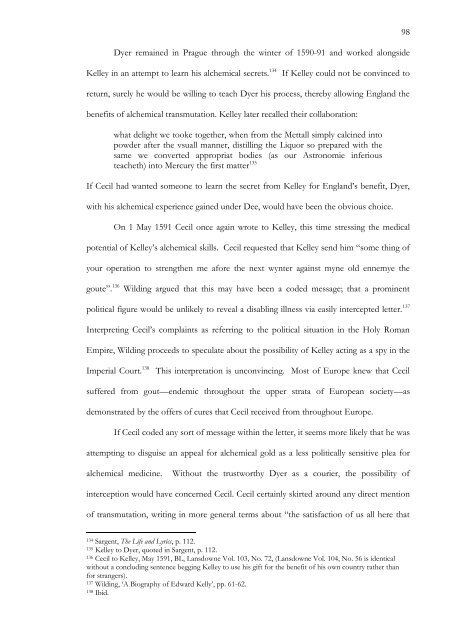The Alchemical Patronage of Sir William Cecil, Lord Burghley
The Alchemical Patronage of Sir William Cecil, Lord Burghley
The Alchemical Patronage of Sir William Cecil, Lord Burghley
Create successful ePaper yourself
Turn your PDF publications into a flip-book with our unique Google optimized e-Paper software.
Dyer remained in Prague through the winter <strong>of</strong> 1590-91 and worked alongside<br />
Kelley in an attempt to learn his alchemical secrets. 134 If Kelley could not be convinced to<br />
return, surely he would be willing to teach Dyer his process, thereby allowing England the<br />
benefits <strong>of</strong> alchemical transmutation. Kelley later recalled their collaboration:<br />
what delight we tooke together, when from the Mettall simply calcined into<br />
powder after the vsuall manner, distilling the Liquor so prepared with the<br />
same we converted appropriat bodies (as our Astronomie inferious<br />
teacheth) into Mercury the first matter 135<br />
If <strong>Cecil</strong> had wanted someone to learn the secret from Kelley for England‘s benefit, Dyer,<br />
with his alchemical experience gained under Dee, would have been the obvious choice.<br />
On 1 May 1591 <strong>Cecil</strong> once again wrote to Kelley, this time stressing the medical<br />
potential <strong>of</strong> Kelley‘s alchemical skills. <strong>Cecil</strong> requested that Kelley send him ―some thing <strong>of</strong><br />
your operation to strengthen me afore the next wynter against myne old ennemye the<br />
goute‖. 136 Wilding argued that this may have been a coded message; that a prominent<br />
political figure would be unlikely to reveal a disabling illness via easily intercepted letter. 137<br />
Interpreting <strong>Cecil</strong>‘s complaints as referring to the political situation in the Holy Roman<br />
Empire, Wilding proceeds to speculate about the possibility <strong>of</strong> Kelley acting as a spy in the<br />
Imperial Court. 138 This interpretation is unconvincing. Most <strong>of</strong> Europe knew that <strong>Cecil</strong><br />
suffered from gout—endemic throughout the upper strata <strong>of</strong> European society—as<br />
demonstrated by the <strong>of</strong>fers <strong>of</strong> cures that <strong>Cecil</strong> received from throughout Europe.<br />
If <strong>Cecil</strong> coded any sort <strong>of</strong> message within the letter, it seems more likely that he was<br />
attempting to disguise an appeal for alchemical gold as a less politically sensitive plea for<br />
alchemical medicine. Without the trustworthy Dyer as a courier, the possibility <strong>of</strong><br />
interception would have concerned <strong>Cecil</strong>. <strong>Cecil</strong> certainly skirted around any direct mention<br />
<strong>of</strong> transmutation, writing in more general terms about ―the satisfaction <strong>of</strong> us all here that<br />
134 Sargent, <strong>The</strong> Life and Lyrics, p. 112.<br />
135 Kelley to Dyer, quoted in Sargent, p. 112.<br />
136 <strong>Cecil</strong> to Kelley, May 1591, BL, Lansdowne Vol. 103, No. 72, (Lansdowne Vol. 104, No. 56 is identical<br />
without a concluding sentence begging Kelley to use his gift for the benefit <strong>of</strong> his own country rather than<br />
for strangers).<br />
137 Wilding, ‗A Biography <strong>of</strong> Edward Kelly‘, pp. 61-62.<br />
138 Ibid.<br />
98















